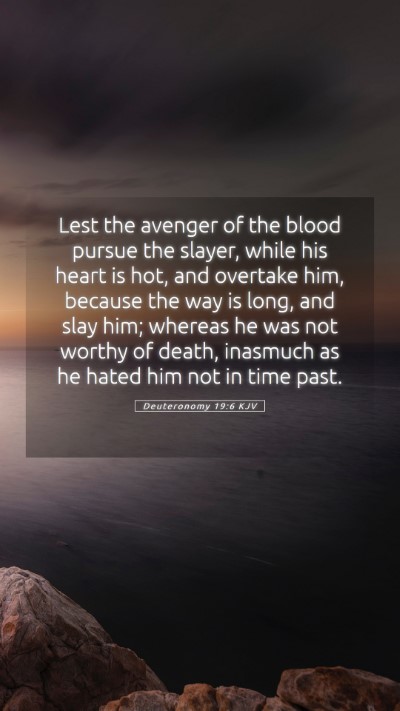Understanding Deuteronomy 19:6: A Commentary
Bible Verse: Deuteronomy 19:6
"Lest the avenger of blood pursue the slayer, when he findeth him, then he shall not be able to take in his hand, and he shall die." [KJV]
Overview
In the book of Deuteronomy, Moses is guiding the Israelites by establishing laws that are meant to create a just society. Deuteronomy 19:6 addresses the laws surrounding accidental manslaughter and the protection of those who unintentionally harm another.
Commentary Insights
This verse reflects significant themes regarding justice, mercy, and protection within the community. The insights from public domain commentaries help explain the deeper meanings, implications, and applications of this verse.
Matthew Henry
According to Matthew Henry, this verse is part of the larger discussion about cities of refuge established for individuals who accidentally kill another person. The “avenger of blood” represents a family member seeking retribution. Henry emphasizes that the law was designed to prevent the cycle of vengeance and to allow a fair trial.
Albert Barnes
Albert Barnes elaborates on the legal implications of the term “avenger of blood.” He notes that such an avenger had the right to seek justice, yet the laws provided a sanctuary for those who committed accidental manslaughter. The intention was not to exonerate but to ensure due process and protection for the accused until a trial could take place.
Adam Clarke
Adam Clarke observes that this stipulation illustrates the balance God intended to create within the justice system. His commentary indicates that these laws were necessary to prevent chaos stemming from personal vendettas. Clarke notes that the slayer would not be able to escape justice if there was clear intent to kill, reinforcing the idea that the heart's intent matters deeply in God's law.
Key Themes and Lessons
- Justice: The verse illustrates the need for a structured legal approach to conflicts within society, seeking justice rather than personal vengeance.
- Mercy: By establishing cities of refuge, God shows His mercy, providing a means for redemption and protection for those who are not guilty of intentional murder.
- Community Protection: The laws serve to protect individuals within the community, maintaining order and ensuring that accidental transgressions do not lead to unjust retribution.
- Heart Intent: The differentiation between murder and accidental death emphasizes God’s understanding of human intent, which plays a critical role in discerning justice.
Further Cross References
- Numbers 35:9-34: Discusses the cities of refuge in detail.
- Exodus 21:12-14: Provides regulations regarding intentional and unintentional killing.
- Joshua 20:1-9: Establishes the cities of refuge as commanded by Moses.
Application to Daily Life
For modern readers, the principles outlined in Deuteronomy 19:6 remain relevant in understanding justice, mercy, and community responsibility. Understanding this verse informs how we navigate conflicts and seek to extend grace within our relationships, advocating for justice while recognizing the complexities of human intent.
Conclusion
Deuteronomy 19:6 serves as an important lesson in Biblical exegesis, highlighting God's intentionality in the law and the balance of justice and mercy. Engaging with this verse through Bible study insights allows believers to better understand the significance of God's commands and their application in both ancient and contemporary contexts.


